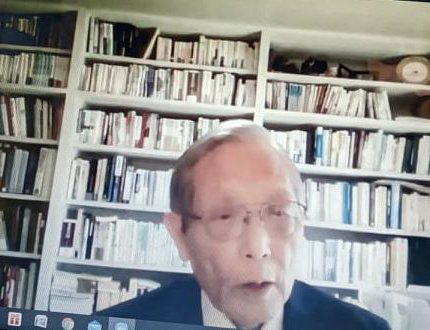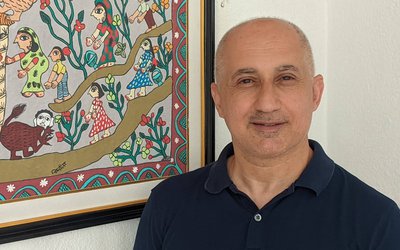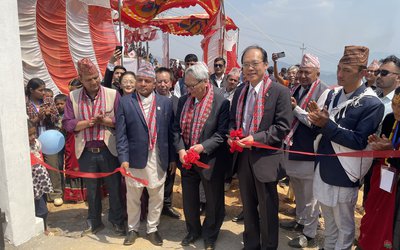
Given your own expertise and experience, how do you explain the devolution of power and its importance to empower people?
In the field of political science and public administration, there are three words that are often regarded as important for the improving quality of democracy. They are r devolution, decentralization, and devolution, all of which deal with the transfer of power from the center to local governments. If these three things are assured, the quality of democracy will perhaps be improved. For the sake of discussion today, let us use decentralization and, devolution interchangeably. Both decentralization and devolution involve four major political issues. They include political devolution, administrative devolution, economic devolution and financial devolution In many countries including Nepal, you tend to focus your attention only on administrative devolution. However, we often overlook the issue of financial devolution. This is quite common in a large number of countries. Even in Japan, a problem remains about financial devolution. The central government has not easily devolved the financial power to the local units..
Is federalism is a panacea for the economic development and the empowerment of people?
No, federalism is not a panacea. The federal structure of the government up to this point remained as an ideal. (Pointing to the diagram on the PC screen). This diagram represents an ideal form of the federal structure of government, where the central government is small. Underneath the central government, e many state and local governments exist, which are more often powerful and dependable. . Under the ideal form of federalism, local units of governments including states ought to be financially independent of the central government. They are financially autonomous. The local units must enjoy autonomy. Thus, you have a very small central government and a very independent provincial and local government. These two governments share resources and power. You may be able to find a federal form in several countries, which have reached very close to an ideal pattern. However, even then, those federal governments seem to have lots of problems. Let’s take Canada. Canada is a highly decentralized country. The federal government in Ottawa is very small and state governments have huge power. One example is Quebec, where Montreal is. If a foreign national want to work in Québec, you should get a Canadian passport and visa to enter Canada. In addition, if you want to work in Quebec, you ought to apply for a visa from the Quebec state government. Otherwise, you cannot work in Montreal. Quebec has been seeking independence for a long time. In the referendums, a large number of English-speaking people living outside Québec usually voted against independence. This is one of the examples to indicate that Federalism is not a panacea. In the case of Canada, the problem of Quebec has been a serious national problem and a bombshell, which may perhaps lead to the disintegration of Canada as a modern state. Another example is Australia which has a weak central government and strong state governments. . Australian government at this very moment is facing a serious problem. The national government has been trying to control the spread of coronavirus infection. The central government has issued many policy directives to mitigate the infection. The problem has been that strong state governments would not listen to the central guidelines. At the long last, the prime minister of the Federal government decided to start a new “National Cabinet.” This meeting is chaired by the prime minister of the Fed. Government. The members of the National Cabinet come from the prime ministers of different state governments. In the National Cabinet, the federal government intends to unite and coordinate different opinions among different state governments. By means of the National Cabinet, the prime minister of the Federal government wants to improve coordination and cooperation among state governments so as to facilitate the control of the pandemic.
What about Asia and Nepal?
In Nepal, the central government is very strong. In a country like Nepal, instead of 3 D (decentralization, devolution and deconcentration), three C’s have been dominant. They are centralization, control and coercion. The central government controls and manages provinces and local governments from the top. Even if you want to start a federal system of government, you will not be able to do so, because you do not have the local infrastructure. For one, you don’t have a group of competent state leaders. You have to produce competent leadership and civil servant working for state governments. Without institution and leadership, you would not be able to initiate a federal structure of government. If you decentralize without dependable infrastructures, you will sooner or later see the disintegration of the country’s politics. If you have already federalized, one of the most important issues is to train government officials as soon as and as many as possible. Integrated Capacity Building is the issue that hinges on the success of federalism in this country. Without a group of state government officials with discipline, chances are that you would be spreading corruption all over the country.
What does Nepal need to do to improve the governance system?
The Transparency International Report rates Nepal’s position very low. Under the current circumstances, even you have state governments with a high incidence of corrupt ins, the people would begin to lose trust in state governments. One of the very important issues that Nepal should undertake as soon as possible to mitigate the “Cancer of Corruption.” Transparency International has ranked Nepal be 173 in the degree of corruption control. My suggestion to Nepal is to initiate the Integrity Capacity Building before you would think of a federal structure of government. Integrated Capacity Building is made up of 5 R’s: Recruitment, Reward, Remuneration, Reeducation and Retirement., Recruiting public officials should be based on fair, open and competitive civil service exams. No nepotism and money should work in the recruitment of competent officials. Reward means providing psychological satisfaction to the officials. They feel that they are a part of the system. Remuneration is to provide monetary compensation of public officials on par with the salary one receives in working in the private sector. Reeducation connotes that public officials should receive education every three years and realize that the corruptions would damage their own professions. Public officials ought to have pride in being a part of the government and working for the welfare of the general public.
How do you share Japan’s devolution?
Japanese government decentralized in 2000. Concurrently, the number and size of the government reduced to the current 1700 units. Now the forms of government have changed from centralized to decentralized forms of government. Unfortunately, many local governments are facing problems of fiscal deficit. They are downsizing local government officials. The number of employees at local government has been reduced. I always tell Japanese public officials: Don’t look up. No money would come from the central government. Don’t look back: Always be innovative and do not think to continue an old method of public management. Look around: you look for any good idea to have been developed in other regions or countries. If you find one, try to copy and incorporate the approach to your method of governing.
Why local government matter?
Ten years ago, we had a big earthquake. The day after the disaster, two photos appeared in different newspapers around the world. These photos impressed many people outside of Japan. Two pictures showed that a large number of victims from the disaster lined up to get relief aids and drinking water. There was no confusion and mayhem. In the middle of confusion in the aftermath of the big quake, in Japan, law and order were kept and no cases of looting. So you ask why? This is because many Japanese trusts the integrity and work of local government officials. In regard to the trust scale, in Japan, the people trust local governments more than the national governments. To that extent, the public trust in local government is important and has been well entrenched in Japan.
How innovative the local governments are?
Japan’s local governments have traditionally been highly innovative. Two examples. Almost all local governments provide a service called “A Bath in the Bus.” The local governments provide a number of vans equipped with the bathing system. These vehicles visit both handicapped and elderly families, who cannot take bath. The bath in the bus comes to one of these needy families and helps them to cleanse their bodies. You may find the same service in Denmark or the US. The difference is that in Japan, the service is extended by local governments, and not by Christian churches or NPO. Likewise, many local governments in Japan distribute an electric pot with sensors. The pot is handed out free to both handicapped and elderly families. How does this pot work? If you do not use the pot for a week, the attached sensor begins to transmit signals to the local governments. The government after receiving the warning signal will then send a social worker to see to it that the resident is safe. Why multilateral and western donor countries have been pressing for devolution power?
In 1989, the World Bank started the campaign to eliminate corruption through devolution of power, which is one of the best ways to eliminate corruption. Therefore, many countries started devolution and tried to implement the decentralized form of government. However, it does not work and the World Bank changed the mind. In 2000, instead of talking about devolution, they are now talking about “good governance.” They also provide good governance indicators. If you clear 109 indicators, you will be qualified to receive the aids from WB. The number of good governance indicators has been increasing to 300. This is a good idea but no many countries will be able to clear these numbers of indicators. . Nepal is now changing from one system to another, but the process should be slow and steady. Only by taking steady and stable methods, you will be able to transform your government with a full of good governance qualities. s.
Do you think Nepal can change the system as Nepal’s western friend says?
It is good for Nepal to change the outlook of the government. You cannot change the whole system in a short period of time. The changing process is strenuous and calls for hard work on the part of the nation’s leaders. I am sure that Nepal would receive a lot of pressure from different donors. But as often said, Rome was not built in a day. Hard work and deep thinking would lead you eventually to the construction of the new system of government.

Keshab Poudel
Poudel is the editor of New Spotlight Magazine.
- CLA: Samriddhi For Skill Development
- Apr 23, 2024
- ECONOMY: Growth At 3.3
- Apr 16, 2024
- DPM’s SHRESTHA’S CHINA VISIT High Profile, Low Key
- Apr 14, 2024
- Maha Kumbha In Barahkshetra: A Sacred Festival In Sacred Koshi (Kaushiki) River
- Apr 09, 2024
- LOSS AND DAMAGE: Upper Tamakoshi A Case
- Apr 02, 2024
















